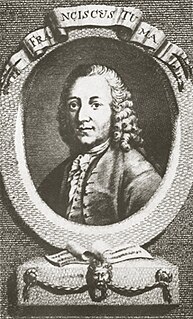Related Research Articles
Kapellmeister is a German word designating a person in charge of music-making. The word is a compound, consisting of the roots Kapelle and Meister ("master"). The word was originally used to refer to somebody in charge of music in a chapel. However, the term has evolved considerably in its meaning in response to changes in the musical profession.

Maximilian II, also known as Max Emanuel or Maximilian Emanuel, was a Wittelsbach ruler of Bavaria and a Prince-elector of the Holy Roman Empire. He was also the last governor of the Spanish Netherlands and duke of Luxembourg. An able soldier, his ambition led to conflicts that limited his ultimate dynastic achievements.
Johann Ernst Eberlin was a German composer and organist whose works bridge the baroque and classical eras. He was a prolific composer, chiefly of church organ and choral music. Marpurg claims he wrote as much and as rapidly as Alessandro Scarlatti and Georg Philipp Telemann, a claim also repeated by Leopold Mozart - though ultimately Eberlin did not live nearly as long as either of those two composers.

Johann van Beethoven was a Flemish-German musician, teacher, and singer who sang in the chapel of the Archbishop of Cologne, whose court was at Bonn. He is best known as the father of the celebrated composer Ludwig van Beethoven (1770–1827). Johann was an alcoholic and an abusive father who often beat Ludwig. At 18, Ludwig had to obtain an order to force Johann to support his family. Johann died soon after Ludwig moved to Vienna to study with Joseph Haydn.

Johann Heinrich Schmelzer was an Austrian composer and violinist of the middle Baroque era. Almost nothing is known about his early years, but he seems to have arrived in Vienna during the 1630s, and remained composer and musician at the Habsburg court for the rest of his life. He enjoyed a close relationship with Emperor Leopold I, was ennobled by him, and rose to the rank of Kapellmeister in 1679. He died during a plague epidemic only months after getting the position.

František Ignác Antonín Tůma was an important Czech composer of the Baroque era. Born in Kostelec nad Orlici, Bohemia, he lived the greater part of his life in Vienna, first as director of music for Count Franz Ferdinand Kinsky, later filling a similar office for the widow of Emperor Karl VI. He was an important late-baroque composer, organist, gambist and theorbist.

Eleonore Magdalene of Neuburg was a Holy Roman Empress, German Queen, Archduchess of Austria, Queen of Hungary and Bohemia as the third and last wife of Leopold I. She was the paternal grandmother of Empress Maria Theresa.
Leopold Hofmann was an Austrian composer of classical music.

Claudia Felicitas of Austria was by birth an Archduchess of Austria and by marriage Holy Roman Empress, German Queen, Archduchess consort of Austria, Queen consort of Hungary and Bohemia as the second wife of Leopold I.

Eleonora Gonzaga, was by birth Princess of Mantua, Nevers and Rethel from the Nevers branch of the House of Gonzaga and by marriage Holy Roman Empress, German Queen, Queen consort of Hungary and Bohemia.

Maria Leopoldine of Austria-Tyrol, was by birth Archduchess of Austria and member of the Tyrolese branch of the House of Habsburg and by marriage the second spouse of her first cousin, Holy Roman Emperor Ferdinand III. As such, she was Empress of the Holy Roman Empire, German Queen and Queen consort of Hungary and Bohemia. She died in childbirth.

Wilhelmine Amalia of Brunswick-Lüneburg was Holy Roman Empress, Queen of the Germans, Queen of Hungary, Queen of Bohemia, Archduchess consort of Austria etc. as the spouse of Joseph I, Holy Roman Emperor.

Paul de Sorbait was an Austrian physician and sanitary engineer.
Georg Reutter was an Austrian organist, theorbo player and composer.
The following is the Jacobite line of succession to the English and Scottish thrones as of the death of Anne, Queen of Great Britain, on 1 August 1714. It reflects the laws current in England and Scotland immediately before the Act of Settlement 1701, which disqualified Catholics from the throne.
Giovanni Felice Sances was an Italian singer and a Baroque composer. He was renowned in Europe during his time.
Giuseppe Tricarico was an Italian church and opera composer. He served as Kapellmeister to the dowager empress Eleonora in Vienna 1660-1663.
Zacher is a German surname. Notable people with the surname include:
References
- ↑ Rudolf Flotzinger, Gernot Gruber - Musikgeschichte Österreichs 1977 "Johann Michael Zächer (Zacher, 1649-1712), 1679-1712 als Domkapellmeister angestellt, 1705 auch als Kapellmeister der."
- ↑ Julie Anne Sadie Companion to Baroque Music 1998 Page 259 Zacher, Johann Michael (1651-1712). Domkapellmeister of St Stephan's (from 1679) and court musician who was appointed Kapellmeister to the dowager empress on the death of Leopold I in 1705. "